2020 Clinical Cancer Advances
Eight projects led or supported by researchers who previously received early-career funding from Conquer Cancer are featured in Clinical Cancer Advances 2020: ASCO's Annual Report on Progress Against Cancer. This independent review of the field, now in its 15th year, showcases major breakthroughs in clinical cancer research and care, as well as emerging trends in oncology.
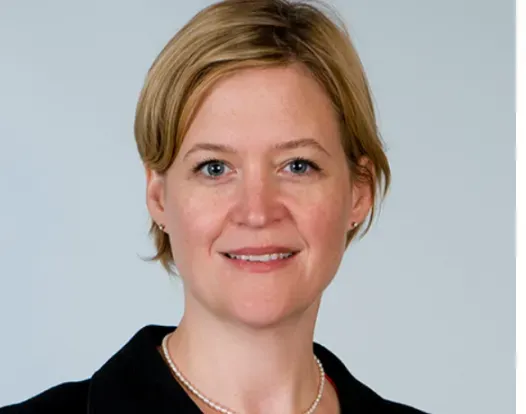
Advance of the Year: Refinement of Surgical Treatment, Pancreatic
At Massachusetts General Hospital, Janet Murphy, MD, is expanding care options for patients with locally advanced pancreatic cancer.
The trial: Patients with pancreatic cancer often have tumors that surgeons cannot remove. To make surgery an option for patients who need it, researchers tested 49 patients with previously untreated locally advanced pancreatic cancer who received a combination of intensive chemotherapy and radiation therapy, as well as the blood pressure drug losartan. For patients who met surgery requirements, an operation was performed either one to three weeks after a short course of radiotherapy or four to eight weeks after a long course for patients.
The results: This study suggests that a prescribed therapy could help more patients prepare for surgery following upfront treatment, though confirmation is needed with randomized trials. Using combination therapy, 34 of 49 participants were able to have tumor removal surgery. In 30 (61%) of the patients, surgery removed all evidence of cancer around the tumor.
The impact: This treatment approach could offer patients with locally advanced pancreatic cancer new hope by enabling surgical removal of previously inoperable tumors and improve survival rates.
Dr. Murphy received a Conquer Cancer Young Investigator Award (YIA) in 2010.

Immunotherapy: Hepatocellular Carcinoma (HCC)
At the University of California San Francisco School of Medicine, R. Kate Kelley, MD, contributes to research improving HCC.
The trial: This was a phase III study that included 707 patients who received the drug sorafenib and had disease progression after at least one systemic therapy; the patients were randomly assigned to receive the drug cabozantinib (a tyrosine kinase inhibitor) or a placebo.
The results: Among patients with previously treated, advanced HCC, treatment with cabozantinib resulted in longer overall survival and progression-free survival than a placebo.
The impact: More options for patients! In January 2019, the FDA approved cabozantinib for patients with HCC who have been treated with sorafenib. And, based upon promising results from cabozantinib in HCC and rationale for combination with immunotherapy, an international, randomized phase III trial of cabozantinib plus atezolizumab versus standard sorafenib is now ongoing.
Dr. Kelley received a Conquer Cancer YIA in 2010.
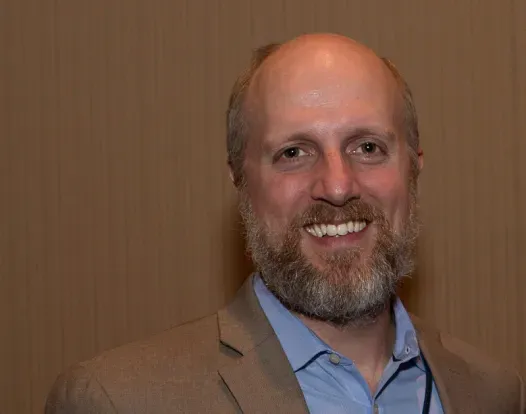
Combination Therapy: Colorectal
Scott Kopetz, MD, PhD, FACP, works to improve outcomes for patients with colorectal cancer (CRC) at The University of Texas MD Anderson Cancer Center.
The trial: Single drugs aimed at inhibiting the gene BRAF have not been effective against BRAF-mutated CRCs. To explore the effectiveness of combing two or three drugs, more than 600 patients with BRAF V600E–mutant CRCs were randomly assigned to one of three groups, each of which was treated with a different combination of drugs.
The results: Median overall survival was significantly improved for both the two-drug ( 8.4 months) and three-drug (9.0 months) groups, compared with standard therapy (5.4 months).
The impact: Median overall survival was significantly improved in patients who received combination therapy compared to patients who received standard therapy.
Dr. Kopetz received a Conquer Cancer CDA in 2008.

Treatment: Leukemia
Naomi J. Winick, MD, and William L. Carroll, MD, improve the cure rates for children with acute lymphoblastic leukemia (ALL) as researchers in the Children’s Oncology Group.
The trial: Methotrexate is an anticancer drug that has been a mainstay ALL treatment for decades, but the most effective and least toxic use of the drug for T-ALL in pediatric patients has been unclear. The study of 1,000 patients compared two approaches using the drug. For one group, researches tried a strategy called Capizzi-style methotrexate (C-methotrexate, or C-MTX) where patients begin with a lower dose of methotrexate, then dosages were increased over time. C-MTX is often coupled with PEG-asparaginase, another drug used to treat ALL. The other group tested high-dose methotrexate (HDMTX) therapy, where patients receive the same high dose of methotrexate throughout treatment. HDMTX is often associated with kidney damage and other adverse events.
The results: C-MTX treatment was superior in terms of five-year disease-free survival and overall survival.
The impact: More children are conquering cancer! The trial showed the best outcomes ever reported for children and adolescents with T-ALL: a 5-year disease-free survival rate of 91.5 percent and overall survival rate of 93.7 percent.
Dr. Winick received a Conquer Cancer YIA in 1985; Dr. Carroll received a Conquer Cancer YIA In 1988.
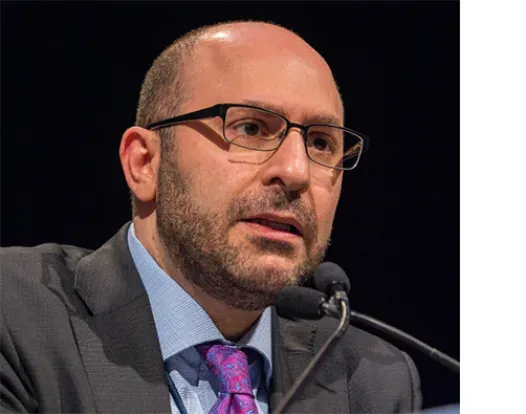
Immunotherapy: Kidney
At Dana Farber Cancer Institute, Toni Choueiri, MD, works to improve care for patients with kidney cancer.
The trial: A total of 886 patients were assigned to receive avelumab (a PD-L1 targeted immunotherapy) plus axitinib (a tyrosine kinase inhibitor) or the standard therapy of sunitinib with receptor tyrosine kinase inhibitor.
The results: RCC patients had significantly better outcomes when their treatment combined the targeted therapy drug axitinib, or Inlyta, with a immunotherapy. The median progression-free survival was 13.8 months for the combination versus 7.2 months for sunitinib. The rate of any adverse events and those grade three or greater were comparable in the two groups (71%).
The impact: Dr. Choueiri's work, combined with other trials, are changing standard first-line therapy for advanced stage kidney cancer. The FDA has approved two new drugs for the treatment of patients with advanced RCC.
Dr. Choueiri received a Conquer Cancer CDA in 2010.
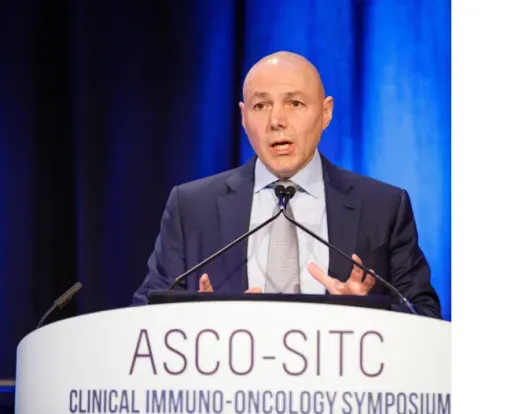
Treatment: Head and Neck
Ezra Cohen, MD, whose work was featured in the 2019 Clinical Cancer Advances, continues to uncover information to help patients with recurrent and/or metastatic head and neck cancer with his research at the UC San Diego Health Moores Cancer Center.
The trial: In this study, patients with recurrent or metastatic head and neck cancer were randomly assigned to receive the drug pembrolizumab (anti-PD1 immunotherapy ) or the investigator’s choice of standard doses of methotrexate, docetaxel, or cetuximab.
The results: The median overall survival was 8.4 months in the pembrolizumab group vs 6.9 months in the standard-of-care group. The benefit with pembrolizumab was more pronounced in patients whose tumors express PD-L1. There were fewer toxicities associated with pembrolizumab use compared with standard-of-care therapy.
The impact: This and another study represent the first of multiple trials that will help to define the optimal treatment approach for patients with recurrent/metastatic head and neck cancer.
Dr. Cohen received a Conquer Cancer YIA in 2003 supported by MGI Pharma, Inc. and a 2005 CDA supported by Sanofi-aventis.
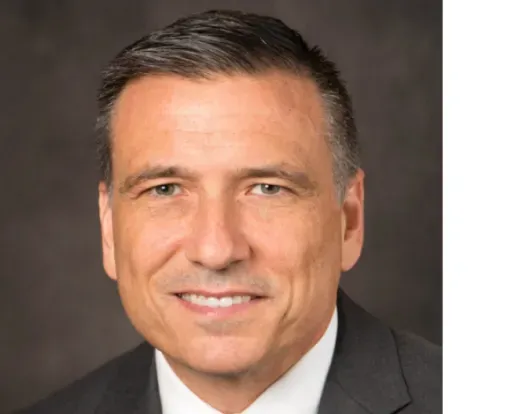
Treatment: Lung Cancer
At The University of Texas MD Anderson Cancer Center, John V. Heymach, MD, PhD, works to improve survival rates for patients with lung cancer.
The trial: A growing body of evidence suggests that more aggressive treatment with radiation (known as local consolidative therapy) or surgery extends survival for select patients with stage IV non–small-cell lung cancer (NSCLC) when cancer has spread outside the lungs. Patients with stage IV NSCLC whose cancer had spread in up to three different areas were randomly assigned to either maintenance therapy with observation or surgery or radiotherapy and maintenance therapy with observation.
The results: The median progression-free survival was more than three times longer for patients undergoing radiation therapy compared with the maintenance/observation group. Likewise, median overall survival more than doubled in the local consolidative therapy group.
The impact: The findings are important because they support the notion that a small number of metastases outside the lungs represent a unique tumor biology that may be managed effectively with local therapy. This approach is now being tested in phase III randomized trials.
Dr. Heymach received a Conquer Cancer YIA in 2003 and a CDA in 2004.

Radiotherapy: Head and Neck Cancer
At Stanford University, Quynh-Thu Le, MD, FACR, FASTRO, leads a team improving treatment for patients with human papillomavirus (HPV) positive head and neck cancer.
The trial: 805 patients with HPV-positive squamous cell carcinoma were randomly assigned to receive radiotherapy plus cetuximab (n=399) or radiotherapy plus cisplatin (n=406).
The results: Data showed that the combination of radiation and cetuximab led to worse outcomes than the combination of radiation and cisplatin , with five-year estimated survival at 77.9% in the cetuximab group compared with 84.6% for the cisplatin group.
The impact: The outcomes of this and another trial have defined cisplatin plus radiotherapy as the standard of care in patients with HPV-positive squamous cell carcinoma.
Dr. Le received a Conquer Cancer CDA in 2002.
A panel of experts in different oncology subspecialties, as well as cancer prevention, quality of care, and health disparities develop Clinical Cancer Advances. Also in the report is ASCO's 2020 priorities for cancer research to accelerate progress against cancer. The research priorities identified by ASCO address vital, unmet needs and help fill knowledge gaps in areas critical to improving patient care.
Conquer Cancer grants funded these researchers at various stages of their careers. Unless noted in the published study, the projects highlighted in this report do not reflect direct funding from Conquer Cancer or the donors who supported the grants.
Your donation supports oncology’s brightest minds in their pursuit of lifesaving research breakthroughs for every cancer, every patient, everywhere.
